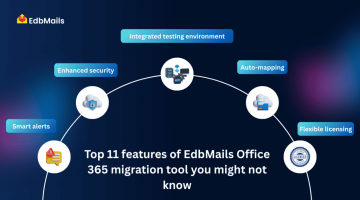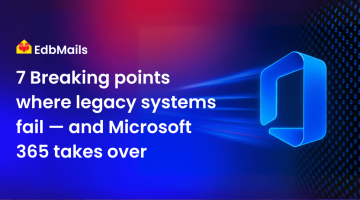Introduction
It is common for IT administrators to question whether migrating to Office 365 is worth the effort. However, an increasing number of organizations are embracing the cloud, driven by the accessibility of information and the clear advantages it provides. Beyond reducing the cost of maintaining on-premises infrastructure, Office 365 offers advanced security, enhanced productivity, and the flexibility modern businesses need.

Key benefits of switching to Office 365
Cost-effectiveness
With Office 365, there is no need to manage local servers, hardware, or their ongoing maintenance. Microsoft takes care of the infrastructure, ensuring compliance with industry standards and certifications. This significantly lowers administrative costs while improving reliability.
Access from anywhere
Office 365 eliminates location barriers by providing access to emails, documents, and applications on desktops, laptops, tablets, and smartphones. Whether on iOS, Android, or Windows devices, users can stay connected and productive from virtually anywhere.
Data loss prevention and security
Data security is a top concern for organizations considering the cloud. Office 365 addresses this with built-in backup mechanisms, advanced data protection, and frequent security updates. Its robust architecture ensures that sensitive information is safeguarded against malware, breaches, and data loss.
Wide range of add-ons
Office 365 provides access to a rich ecosystem of add-ons and applications. Depending on your business needs, you can integrate tools that extend functionality beyond the native suite, allowing your teams to work more efficiently.
Seamless collaboration
Collaboration is at the core of Office 365. With features such as Office 365 groups, instant messaging, large mailbox sizes, and document sharing, employees can work together in real-time across departments and geographies.
Switching to Office 365
While the benefits are clear, moving to Office 365 requires careful planning. Migration can be a single-stage or multi-stage process, depending on the version of your on-premises Exchange server. For some organizations, this may span weeks or even months. Without the right approach, the process can be complex and time-consuming.
Exchange 2010 to Office 365 migration
For businesses still running Exchange 2010, migration to Office 365 can appear challenging. However, professional migration tools simplify the transition, ensuring zero downtime and secure mailbox transfer. One such solution is EdbMails Office 365 migration tool, which enables seamless migration of all mailboxes, public folders, and associated data from Exchange to Office 365 with minimal effort.
Conclusion
Switching to Office 365 delivers long-term benefits in cost savings, collaboration, and security. Although migration can be complex, using professional tools like EdbMails Office 365 migration ensures a smooth, secure, and hassle-free transition. With the right approach, organizations can unlock the full potential of the cloud and empower their teams to work smarter and faster.
Frequently asked questions (FAQs)
1. Why should organizations consider migrating to Office 365?
Migrating to Office 365 offers cost savings, enhanced security, and improved productivity. It eliminates the need for on-premises infrastructure while providing anywhere access, collaboration tools, and continuous updates from Microsoft.
2. Is Office 365 secure enough for sensitive business data?
Yes. Office 365 comes with enterprise-grade security features, including data encryption, multi-factor authentication, compliance certifications, and advanced threat protection. Microsoft also ensures regular security updates and 24/7 monitoring.
3. How difficult is it to migrate from Exchange 2010 to Office 365?
The complexity depends on the size of your organization, mailbox volume, and current server setup. Manual migration can be time-consuming, but professional tools like EdbMails Office 365 migration tool simplify the process by ensuring secure and downtime-free mailbox transfer.
4. Can Office 365 be accessed on mobile devices?
Absolutely. Office 365 is compatible with multiple platforms, including iOS, Android, and Windows. Users can access their emails, files, and apps seamlessly from smartphones and tablets, ensuring productivity on the go.
5. What is the role of third-party migration tools like EdbMails?
Third-party tools automate and streamline the migration process, reducing complexity and risks. EdbMails, for example, supports full mailbox migration, public folder transfer, and incremental sync, ensuring no data loss and minimal business disruption.
Read more:



